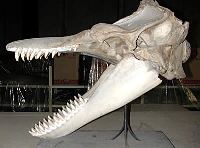Prehistorc whale's sceleton found in Italy
Italian researchers have found the skeleton of a 10-meter-long (33-foot) prehistoric whale.This discovery can help shed light on the ancient environment of the sea.

The skeleton dates to 4 million years ago, to the Pliocene epoch, and was found in almost perfect order _ only the jaw bones were out of place, said paleontologists with the Museum of Natural History in Florence who are studying the fossil.
Findings of cetaceans in the area once covered by waters like virtually all of Italy are not unusual. But the fact that the skeleton is complete and that a wealth of organisms were found around it make the discovery extraordinary, officials said.
"The finding is spectacular," said Elisabetta Cioppi, the head of the museum's paleontology department and the coordinator of the excavation.
"The variety of the sea organisms associated to the whale shells, fish and others is extraordinary. It enables us to make a thorough reconstruction of the environment," she told The Associated Press in a telephone interview.
Fish and other sea organisms are believed to have lived off the whale's decomposing body for decades. Cioppi said researchers are cataloging the organisms for future lab research.
Also found among the whale bones were some shark teeth, leading researchers to believe that the whale was attacked just before it died. Cioppi said it was too soon to tell whether the shark attack was the cause of the death, adding that more research was needed.
Excavations to bring the whale bones to light began in February after the museum was alerted by an amateur researcher who came across the bones while digging for fossils last year. The skeleton was found about 100 meters (yards) below ground in Orciano Pisano, about 85 kilometers (50 miles) east of Florence, said a statement by the Florence museum.
Today, this Tuscan countryside blessed with lavish vegetation and rolling hills is an unlikely site for marine life. But millions of years ago it was covered by a warm and rich sea, full of life. Its clay sediments have yielded bones and fragments for centuries.
Other whale skeletons have been found elsewhere in Italy, including one under a Tuscan vineyard only weeks ago, according to news reports and officials.
"This is not an unusual" discovery, said Prof. Alessandro Garassino, of Milan's Museum of Natural History. "But it does confirm that the Mediterranean is favorable to the development of these sea mammals."
The waters that covered the area started receding about 1.5 million years ago, Garassino said.
The whale fossil is expected to be taken to the Museum of Natural History in Florence and put on display once it is restored.
Subscribe to Pravda.Ru Telegram channel, Facebook, RSS!


